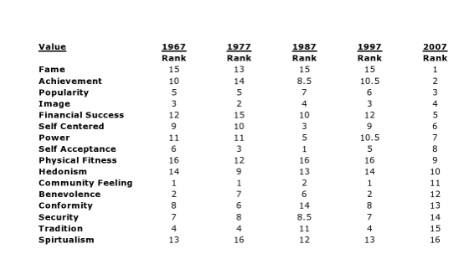It’s an age-old refrain — adults claim that kids today are completely different from when they were growing up, usually for the worse. And that claim often extends to the TV shows that kids are exposed to – more sex, less depth, endless shows about celebrities and reality TV show stars.
But hasn’t Hollywood always glamorized being rich and famous? The pursuit of fame is embedded in the fabric of our society, in America – every person, no matter where they come from, is supposed to have the opportunity to become successful and achieve to their fullest extent.
So maybe adults are just waxing nostalgic about the past, and things really haven’t changed that drastically. Our study, completed at the Children’s Digital Media Center@LA and just published in Cyberpsychology here, suggests otherwise.
We took a look at the top two shows for tweens, age 9-12, in one year of the last 5 decades. Children at these ages are beginning to form their values, as they move from their families being the most important sphere of influence to peers and other forces outside of the home gaining more influence.
We found that the most important value of tween television shows in 2007 is fame, out of a list of 16 values. Moreover, in every other decade, from the sixties to the nineties, fame ranked at the bottom of the list! So, in just one decade, from 1997 to 2007, fame went from being the least important value to the most important value. In stark contrast, community feeling, number one or two in every other decade, dropped to number 11 in 2007. The table below shows the ranking for each decade, keyed to the 2007 ranks.
You get the idea from these promotional pictures below, on the left, Hannah Montana from 2007 is front and center, by herself with a microphone, while Richie Cunningham on the right from 1977 is surrounded by his family in the lower right hand side of the photo.


Or if you listen to this radio show, taped for the Madeline Brand Show on KPCC, about our study, it takes an audio clip from Andy Griffith and Hannah Montana.
So it turns out those adult doomsayers might be on to something. In fact, as the NY Times wrote, it seems pretty clear that television for children in the 21st century is different. Cable stations create programming that is available around the clock, not only on traditional TV sets, but also for the Internet and mobile devices. The most popular TV shows don’t just stay on TV, they can become live concerts, feature films, YouTube video clips and more. For example, Glee began as a fictional TV show, then added a live concert tour, a 3D concert movie and wait for it… a reality TV show where contenders vie for a coveted spot on Glee.
And as our study shows, it’s not just access and more programming, TV content has changed as well. Today, children can watch dozens of reality TV programs with every day people reaching extraordinary levels of renown as well as fictional shows featuring successful teenage protagonists. They also witness adolescents becoming Internet sensations, starting out on YouTube and going on to become household names.
So what does this mean and why is it important? TV content has the potential of socializing children more than at any other point in its history. Even though children have more media choices they still watch television an average of 4 ½ hours a day! They may not always watch it live, on a TV set in their home, but they are watching it more now than ever before.
If the messages kids see are about teenagers achieving great success by being famous, at an age when tweens crave popularity and status among their friends, it’s only natural for kids to start wanting this for themselves. Kids in fact usually dream big. But in today’s world, with YouTube, Facebook, blogging and all the means that children have access to an audience, they have tools at their fingertips to enact fame. And the inexperience to think that fame comes easily, without a connection to a talent or hard work.
Could we be building a nation of self focused, fame seeking children? Who might those children become? Fake Botox mom? Balloon Boy parents? And what happens to those who don’t get their fifteen minutes?
Then again, perhaps the focus on fame is as basic to our society as apple pie and baseball. As one famous American put it:
“This is America, where everyone has the right to life, love and the pursuit of fame.”
Ryan Seacrest, American Idol, 2010
First published on Parenting in the Digital Age.
